Resisting “Brainwashing” Conditions (CT Scan, Episode 90)
“Brainwashing,” defined as one-sided indoctrination, can be harder to resist in environments that hamper critical thinking. Classic brainwashing conditions include poor nutrition, isolation, and sleep deprivation, which students may unwittingly experience at university. Here are research-backed tips for taking care of yourself physically, mentally, and spiritually to resist indoctrination.
___________
DIGGING DEEPER
🔹 Mitchell, T. (2016). Are We Brainwashing Our Children? https://answersingenesis.org/apologetics/critical-thinking/are-we-brainwashing-our-children/
🔹 Bergman, J. (2001). The Darwinian Foundation of Communism. https://answersingenesis.org/charles-darwin/racism/the-darwinian-foundation-of-communism/
🔹 Ham, K. (2009). Who is Doing the Brainwashing? https://answersingenesis.org/blogs/ken-ham/2009/06/28/who-is-doing-the-brainwashing/
🔹 Logic topic: https://answersingenesis.org/logic/
___________
DONATIONS
https://answersingenesis.ca/donate/
___________
ANSWERS TV
Patricia’s Critical Thinking Course based on these videos is available on Answers.TV. Sign up for your free trial and check it out!
#pengleraig
___________
CITED REFERENCES
Wurmbrand, R. (1969). Tortured for Christ: Christians Suffering in Communist Prisons. New York: Spire Books.
Coates, D. D. (2016). Life inside a deviant “religious” group: Conformity and commitment as ensured through ‘brainwashing’or as the result of normal processes of socialisation. International Journal of Law, Crime and Justice, 44, 103-121.
Orquin, J. L., & Kurzban, R. (2016). A meta-analysis of blood glucose effects on human decision making. Psychological Bulletin, 142(5), 546.
Dickinson, D. L., McElroy, T., & Stroh, N. (2014). Impact of glucose on Bayesian versus heuristic-based decision making. Journal of Neuroscience, Psychology, and Economics, 7(4), 237.
Masicampo, E. J., & Baumeister, R. F. (2008). Toward a physiology of dual-process reasoning and judgment: Lemonade, willpower, and expensive rule-based analysis. Psychological science, 19(3), 255-260.
Lemaire, J. B., Wallace, J. E., Dinsmore, K., Lewin, A. M., Ghali, W. A., & Roberts, D. (2010). Physician nutrition and cognition during work hours: effect of a nutrition based intervention. BMC health services research, 10(1), 241.
Pilcher, J. J., & Walters, A. S. (1997). How sleep deprivation affects psychological variables related to college students' cognitive performance. Journal of American College Health, 46(3), 121-126.
Engle-Friedman, M., Mathew, G. M., Martinova, A., Armstrong, F., & Konstantinov, V. (2018). The role of sleep deprivation and fatigue in the perception of task difficulty and use of heuristics. Sleep Science, 11(2), 74.
Killgore, W. D., Killgore, D. B., Day, L. M., Li, C., Kamimori, G. H., & Balkin, T. J. (2007). The effects of 53 hours of sleep deprivation on moral judgment. Sleep, 30(3), 345-352.
Barnes, C. M., Gunia, B. C., & Wagner, D. T. (2015). Sleep and moral awareness. Journal of Sleep Research, 24(2), 181-188.
Bennett, A. A., Gabriel, A. S., & Calderwood, C. (2019). Examining the interplay of micro-break durations and activities for employee recovery: A mixed-methods investigation. Journal of Occupational Health Psychology.
Pearson, D. G., & Craig, T. (2014). The great outdoors? Exploring the mental health benefits of natural environments. Frontiers in psychology, 5, 1178.
Hefner, Jennifer, and Daniel Eisenberg. "Social support and mental health among college students." American Journal of Orthopsychiatry 79.4 (2009): 491-499.
Lubans, D., Richards, J., Hillman, C., Faulkner, G., Beauchamp, M., Nilsson, M., ... & Biddle, S. (2016). Physical activity for cognitive and mental health in youth: a systematic review of mechanisms. Pediatrics, 138(3).
Llewellyn, D. J., Lang, I. A., Langa, K. M., & Huppert, F. A. (2008). Cognitive function and psychological well-being: findings from a population-based cohort. Age and ageing, 37(6), 685-689.
Rezaei, R., Saatsaz, S., Nia, H. S., & Behedhti, Z. (2015). Anxiety and critical thinking skills in nursing students. Journal of Education, Society and Behavioural Science, 1-7.
Scott, H., & Woods, H. C. (2019). Understanding links between social media use, sleep and mental health: recent progress and current challenges. Current Sleep Medicine Reports, 5(3), 141-149.
Barthorpe, A., Winstone, L., Mars, B., & Moran, P. (2020). Is social media screen time really associated with poor adolescent mental health? A Time Use Diary Study. Journal of Affective Disorders.
Twenge, J. M., & Farley, E. (2020). Not all screen time is created equal: associations with mental health vary by activity and gender. Social psychiatry and psychiatric epidemiology, 1-11.
Madhav, K. C., Sherchand, S. P., & Sherchan, S. (2017). Association between screen time and depression among US adults. Preventive medicine reports, 8, 67-71.
-
![The Cognitive Crucible & Health Propaganda [Ep. 31]](https://hugh.cdn.rumble.cloud/s/s8/1/3/Q/t/q/3Qtqn.Rkob-small-The-Cognitive-Crucible-and-.jpg) 45:31
45:31
Healthy & Awake Podcast
7 months agoThe Cognitive Crucible & Health Propaganda [Ep. 31]
6251 -
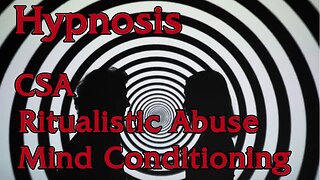 3:27:08
3:27:08
thewolfwithin
1 year agoMy journey and remembering of CSA #12: WEDNESDAY Hypnosis, mind bending & the last breaking
932 -
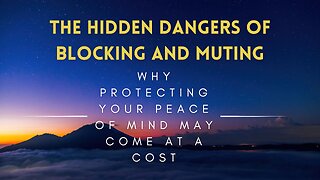 5:26
5:26
Information for Life - Insights and Ideas to Navigate Your World
6 months ago10 - The Hidden Dangers of Blocking and Muting - Why Protecting Your Peace of Mind May Come at Cost
35 -
 1:04:34
1:04:34
Sarah Westall
11 months agoMass Brainwashing Psychosis behind current Unconventional MindWar w/ Donald Jeffries
12.9K23 -
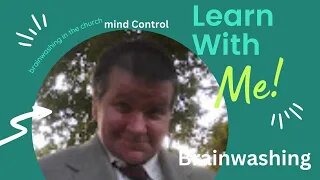 24:54
24:54
miwilliam
11 months agoIssues with brainwashing, mind control in religion part 2
75 -
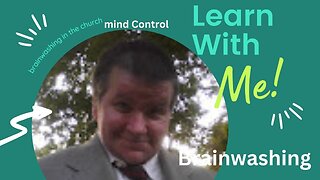 27:08
27:08
miwilliam
11 months agoIssues with brainwashing, mind control in religion part 1
72 -
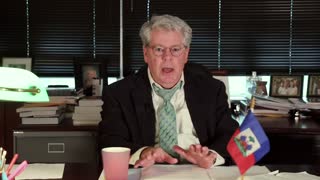 23:44
23:44
travismcneely1989
3 years ago $0.03 earnedA Former Critical Theorist Tells His Story (CRT Series Episode 1)
244 -
 1:45:20
1:45:20
Mycelial Mamma - New Earth Propagation
4 months agoWildly Delicate - Fallen Angelics & Hijacked Consciousness - Episode #1
901 -
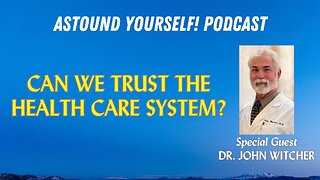 53:43
53:43
Astound Yourself! Podcast
6 months agoEpisode #4: DR. JOHN WITCHER: Why We Should Be Skeptical of the Current Health Care System
137 -
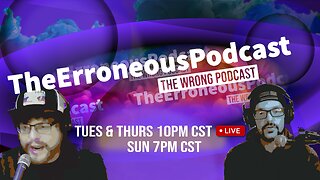 4:31:17
4:31:17
The Erroneous Podcast
10 months agoEpisode 67: Turtles, Meth, and Blood Injections - The Holy Trinity of Eccentricity
5981